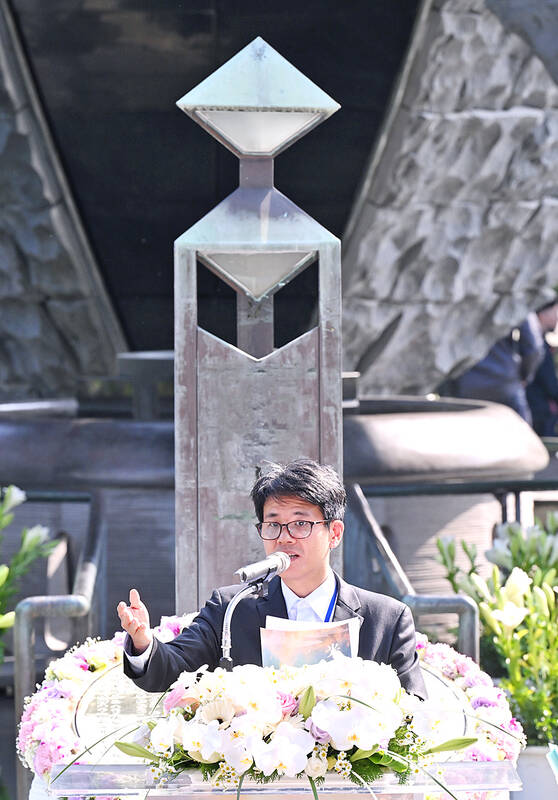The Chen Cheng-po Cultural Foundation yesterday announced that a minor planet has been named after late Taiwanese artist Chen Cheng-po (陳澄波).
The International Astronomical Union in January approved the name designation “Chenchengpo,” recognizing Chen as one of the “most iconic figures in Taiwanese art history.”
However, the foundation only shared the news on Facebook yesterday, the 78th anniversary of the 228 Incident — a mass crackdown in which Chen was among those executed by the then-Chinese Nationalist Party (KMT) regime.

Photo: Liu Hsin-de, Taipei Times
It expressed hope that the naming would encourage more people to learn about the historical event. Some estimates place the total death toll of the crackdown as high as 20,000.
Born in 1895 during the Japanese colonial era, Chen was a prolific artist known for “fusing Chinese and Western techniques” while exploring “avant-garde ideas,” the foundation said.
He was the first Taiwanese artist whose oil paintings were featured in the Japanese Imperial Art Exhibition.
The minor planet was discovered by Lulin Observatory in Nantou County in 2007 and was initially named 2005 EW228.

The manufacture of the remaining 28 M1A2T Abrams tanks Taiwan purchased from the US has recently been completed, and they are expected to be delivered within the next one to two months, a source said yesterday. The Ministry of National Defense is arranging cargo ships to transport the tanks to Taiwan as soon as possible, said the source, who is familiar with the matter. The estimated arrival time ranges from late this month to early next month, the source said. The 28 Abrams tanks make up the third and final batch of a total of 108 tanks, valued at about NT$40.5 billion

Two Taiwanese prosecutors were questioned by Chinese security personnel at their hotel during a trip to China’s Henan Province this month, the Mainland Affairs Council (MAC) said yesterday. The officers had personal information on the prosecutors, including “when they were assigned to their posts, their work locations and job titles,” MAC Deputy Minister and spokesman Liang Wen-chieh (梁文傑) said. On top of asking about their agencies and positions, the officers also questioned the prosecutors about the Cross-Strait Joint Crime-Fighting and Judicial Mutual Assistance Agreement, a pact that serves as the framework for Taiwan-China cooperation on combating crime and providing judicial assistance, Liang

A group from the Taiwanese Designers in Australia association yesterday represented Taiwan at the Midsumma Pride March in Melbourne. The march, held in the St. Kilda suburb, is the city’s largest LGBTQIA+ parade and the flagship event of the annual Midsumma Festival. It attracted more than 45,000 spectators who supported the 400 groups and 10,000 marchers that participated this year, the association said. Taiwanese Designers said they organized a team to march for Taiwan this year, joining politicians, government agencies, professionals and community organizations in showing support for LGBTQIA+ people and diverse communities. As the first country in Asia to legalize same-sex

MOTIVES QUESTIONED The PLA considers Xi’s policies toward Taiwan to be driven by personal considerations rather than military assessment, the Epoch Times reports Chinese President Xi Jinping’s (習近平) latest purge of the Chinese People’s Liberation Army (PLA) leadership might have been prompted by the military’s opposition to plans of invading Taiwan, the Epoch Times said. The Chinese military opposes waging war against Taiwan by a large consensus, putting it at odds with Xi’s vision, the Falun Gong-affiliated daily said in a report on Thursday, citing anonymous sources with insight into the PLA’s inner workings. The opposition is not the opinion of a few generals, but a widely shared view among the PLA cadre, the Epoch Times cited them as saying. “Chinese forces know full well that